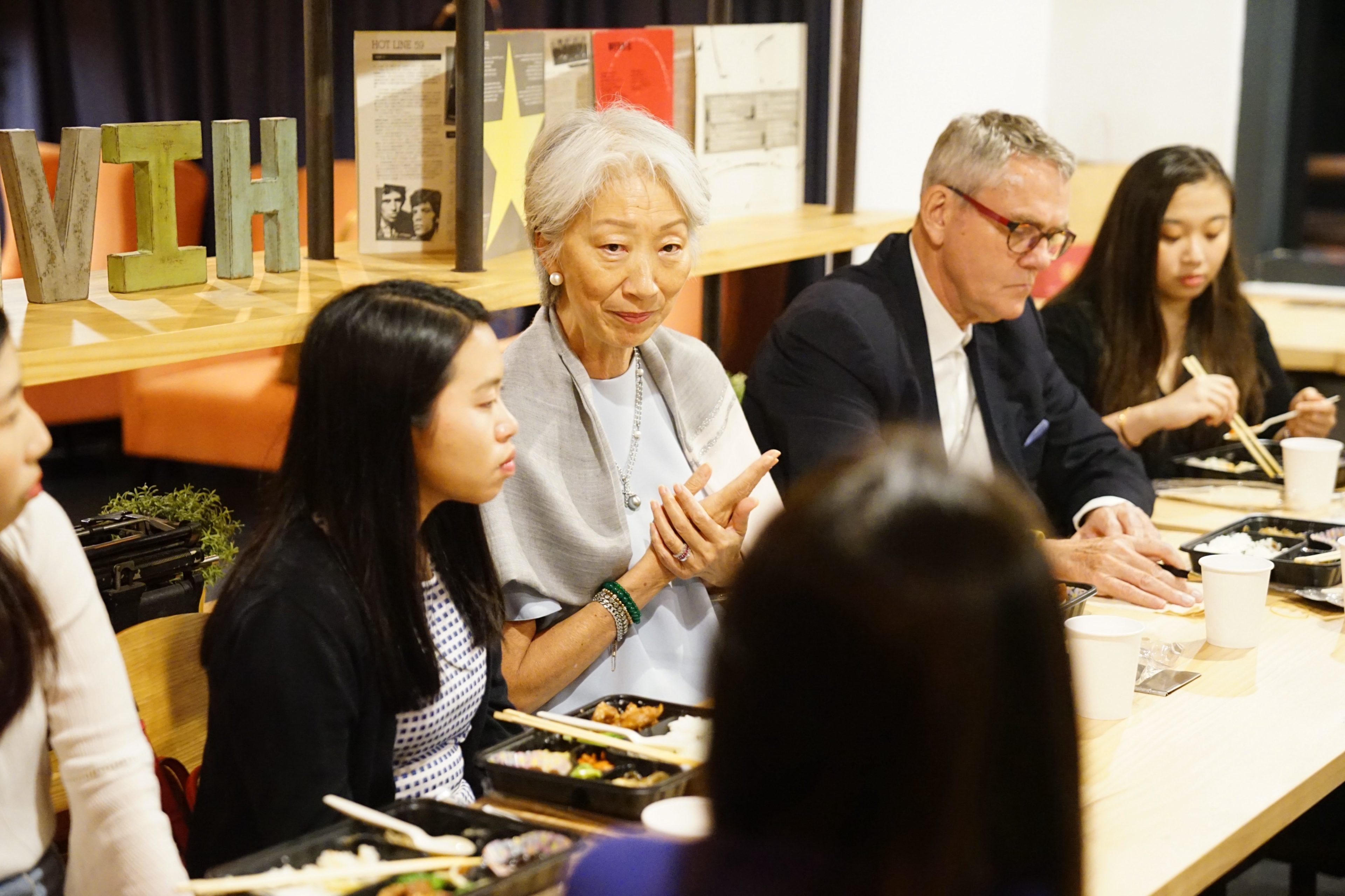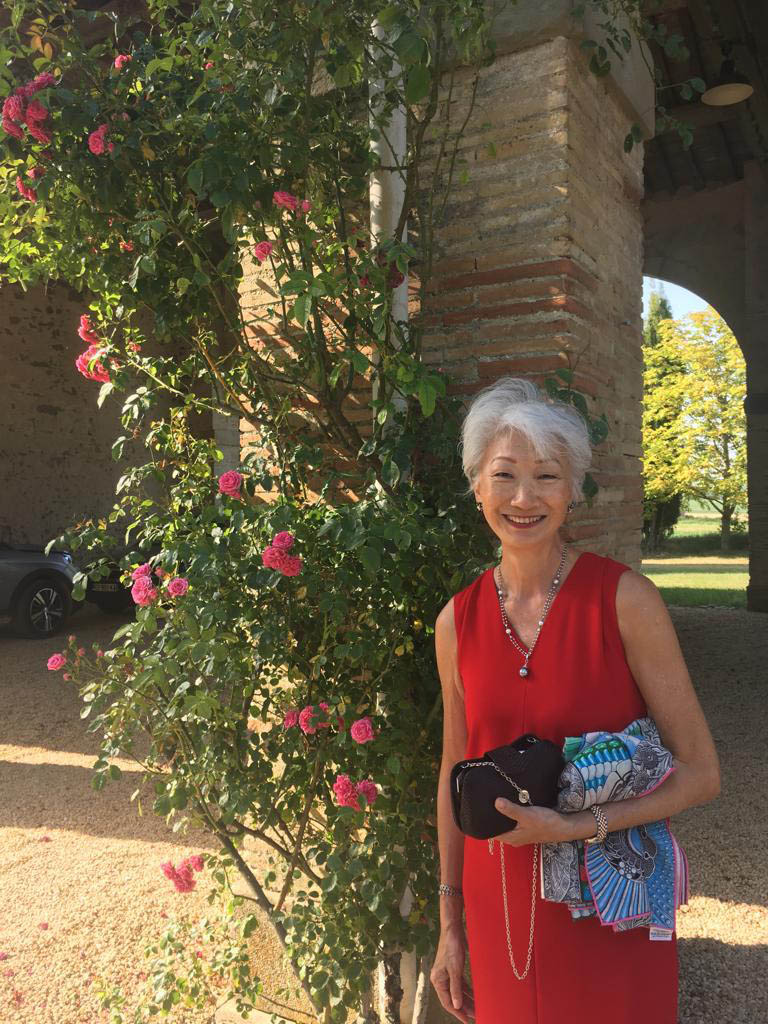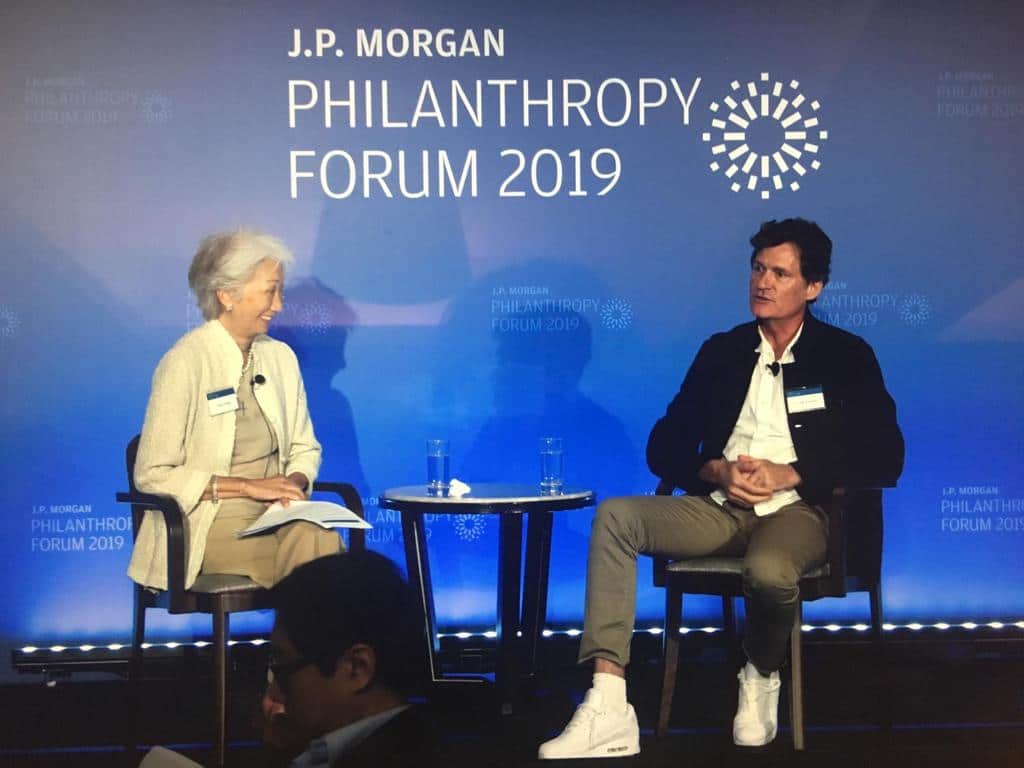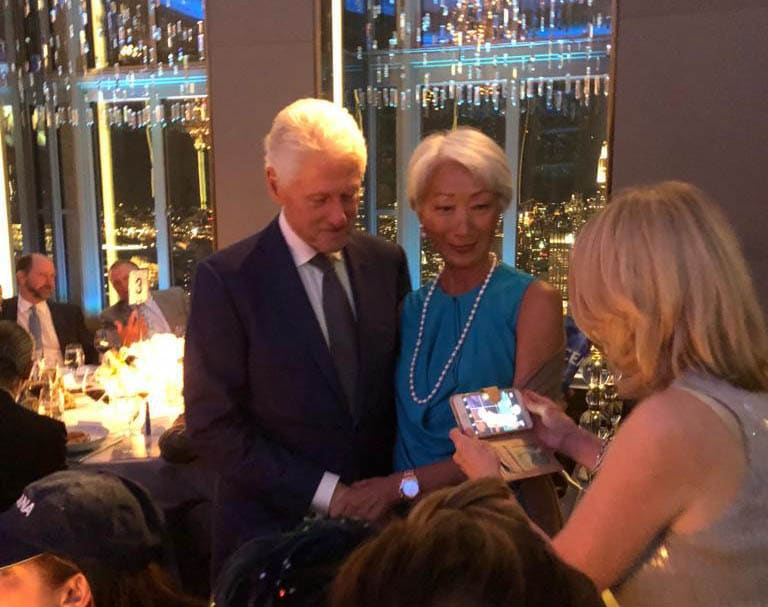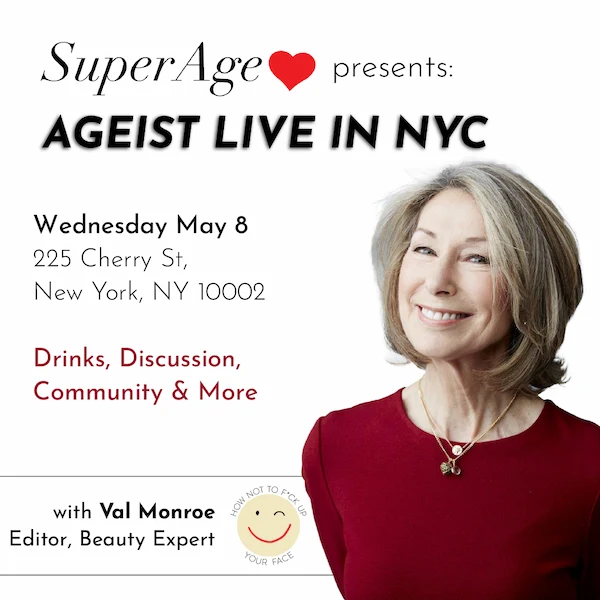Jean Sung has experienced the world from many different perspectives, she has connected with the neediest to the most privileged. This experience has led her to make it her mission to improve the lives of others. Although she did not grow up wealthy, her parents were able to expose her to a privileged environment, via her father’s business connections. Jean is a Hong Kong native, but spent part of her formative years being educated in the Philippines. During her time there, she witnessed the huge divide between those at the apex of society and those scraping by, selling chewing gum by the stick, in order to survive and feed their families.
As a lifelong rebel and contrary thinker, and having witnessed the stark contrast between the highest levels of privilege to the lowest levels of poverty, she felt herself undergo a transformation. “I started my social working career with a children’s charity, as “chief cook and bottle washer”, then after some time I became the fundraising chair of that child caring charity, and then the job at JP Morgan came to me. My life as it is now was not always perfect, but having seen the extremes between poverty and privilege, I realized that I wanted to use my experiences and dedicate myself to volunteering work, and helping others. Everyone deserves a chance and everyone needs a helping hand, at times. Everything is a learning step, and how you use those experiences from childhood to adulthood is vital to growth as a person. The visibility I was given, into very different walks of life have allowed me to gain perspective on the reality of the world that we live in. It gave me the desire to make a change, to help improve someone else’s life. One at a time is perfectly ok for me.”
Jean is one of the wisest people we have ever met. She is humble and straight-talking, inspiring a fearsome loyalty from all who meet her. Her generosity of time in helping and advising others, including us at Ageist, is profound. When we think of role models for ourselves, we think of Jean.
Giving With Purpose and Intent
How did you become involved in the world of organized giving?
Someone said to me that Chinese women do not volunteer. That kind of gave me the impetus to show her this is a myth. So I did volunteer. We do wish to help, to be engaged — to be participating in a meaningful way regardless of who we are. I realized I was “good at it.” I can articulate a needy situation to a giver and be able to appeal with conviction. I understood myself more through my commitment to help a marginalized, underserved community. I saw that I can live a life of purpose: to help another.
This is the same philosophy I have with Giving…purpose and intent. Whether when I was a volunteer, or as a corporate grantor, I have always believed in a focused, structured giving mentality. Look at it another way: if you were in a for-profit business, would you just put your resources without thought or analysis? In giving, the goal is meant to make a difference to the recipient, to a situation. It’s meant to improve, to increase, to enhance, to make better… As an example, one could be asked: I would like to support a school lunch. Why? It won’t help the situation except for one meal. This would only mean that those students are not able to go to school with a packed lunch or that their families were not able to sign them up for school-provided lunches. The one-off gesture is a band-aid reaction — it doesn’t look at the root problem. These children may come from challenging social economic families (unemployment or distressed families) — it would be more effective and efficient if one could look at the root problem and look at a mid to longer term support, e.g. alternate skills at work for the family provider, investigate the family dynamics, offer mentorship, network support for that community. Solve the problem with solutions.
One of the Most Memorable Gifts
What are some of your most memorably impactful initiatives?
A philanthropic giver read about the living conditions for some of our city’s “abandoned” matured adults. Over 100,000 of these folks live in half a bunk bed in a sub-divided small unit where ventilation, sanitation, and cooking is limited. It is not safe to live in such squalid conditions. These folks have little in the way of public subsidies, no more than an equivalent US$400 a month. Out of this, they have to pay rent for half a bunk bed of US$200, then there are utilities, food. This living is unimaginable in a city such as ours when majority of these folks have probably spent their adult lives serving this city. This giver wanted to set up a fund for these folks and move them to a more suitable, recognized adult living center. On the day of moving for a number of these adults, one lady said to me, “I don’t want to move!” I said, “Why? You have seen the room you are going to and it will be a much nicer environment.” She said, “…what will happen if you die? I would not even be able to come back here…” At that point, my tears and my throat welled up and I told this lady that she does not have to worry because she is not coming back here. The giver’s family are all behind this gift so that she can live out her life with respect and dignity.
This is probably one of the most memorable gifts. When I can see the difference it made to a number of folks who have worked hard all their lives and now there is a safety ring. More importantly that someone, a total stranger, cared for them.
“This will be the generation that will make a difference”
Your work is around helping people and companies make a difference in the world. These could be large initiatives or smaller ones. How has your experience in giving affected your daily life in the world around you personally?
The people I meet, the diversified and variety of work that I see — they are meaningful. They are change-makers. I also meet a number of social entrepreneurs, innovators, who are committed to give their best — this will be the generation that will make a difference. Their voices count and it empowers me to believe that the world is in their hands; it is up to them to make a difference.
“What is the actual measurement of success?”
Your work has you embracing a lot of new learning. How do you approach learning something new?
This is the challenge. With the advance of technology and the live feeds, the videos, the social media, and the list goes on, I can’t even begin to count what is available to read, to absorb — it makes the mind boggle. But what works? What is the actual measurement of success? I challenge the success rate — Why do we still have illiteracy?
I am curious to learn and to hear of new giving models, but there is not one place that you can go “search”… the social sector could benefit from a single platform or an M&A to reach deeper and broader. We have over 8,000 registered charities in Hong Kong with a population of 7+ million people. Organizations are working against each other in terms of funding appeals, in the same pool. Are we adding to the top of the pyramid or should we increase benefit to the bottom of the marginalized pyramid? We need to have stronger leadership, higher capacity that can serve the needs of our community.
“A charitable organization must have a business plan. It must be managed like a for-profit entity.”
How do you advise your clients on giving? I understand that it is very data-driven results-oriented. How did you come to this?
It is important to base your giving on evidence. Technology again is at the forefront of collecting information. Once you have collected the evidence of needs you can begin to build the response, the interventions, but it has to be a foundation of change. A charitable organization cannot survive on charitable reactive giving alone. It must have a business plan. It must be managed like a for-profit entity. Be analytical, examine risks, build resilience, and look at partnerships! Our social problems are so vast, not one organization can tackle the situation. We must chart the course, look at the desired result, the destination, strategize and select your partners, define the performance metrics, launch a model with checks and balances. Look at the possibility of advocating for policy change — this can truly increase scale with a multiplier effect.
We are not short of philanthropists’ generosity, but we have a capacity issue. E.g. even if we said we will stop all the plastics in the oceans, can it be done? We must base our work on research with facts and data that can move the dial. We can rather look at the steps that can lead to positive change.
“I found that it is the love of my work that gets me up in the morning”
There is a lot to care about in the world right now. It is easy to feel helpless. How does one of whatever financial means identify the area they wish to make an impact in?
Identify what you do best. There’s the destination. Then, you could develop the journey that you adopt in making change. My feeling is always yourself, do what you know best, be bold… take on the challenges…
I found that it is the love of my work that gets me up in the morning. It is also my own determination not to let myself down in the work that I know how to do best. I am good at it. I can respond and help turn a vision into reality. Someone said to me a long time ago, “If we wish to be someone else, be sure you really want the whole package.” So why try to copy?
“Transforming education has my full attention”
What are the areas that you personally feel have the most need and the best ability for an individual to make an impact?
Transforming education has my full attention. Our systems have little evolvement in that our students strive for grades because this is how they are marked. This is how they will move from one class to another. What about the value of education? Should it just turn students out to what society believes that they should be? What about being an individual? Be an independent thinker — do what they do best. We must offer students the opportunity to be themselves. If you love what you do, if you are good in what you do, there will be happy people.
“Always help yourself first”
There must be a lot of demands on your time. How do you manage it? Our busy readers always love to know.
Time management is always difficult for me because I always have on my mind so many things that I wish to do, to complete, to respond, to communicate. We don’t have unlimited hours and I don’t think we can have it all! Something, someone has to give!
The formula that I have is periods of time that I carve for myself. It could be having a lunch date with yourself, a drink or dinner date with yourself that you can do nothing or something. That time is yours and you let your partner or spouse know to respect that time for just yourself. Believe this way: it keeps our minds free from obligation, responsibility —it’s your time. We have to love and respect ourselves first — it’s like that oxygen mask on the plane. When it drops, put it on yourself first. If you are good, you can help others… (I told my daughters the same thing when they were first travelling on their own…) Always help yourself first.
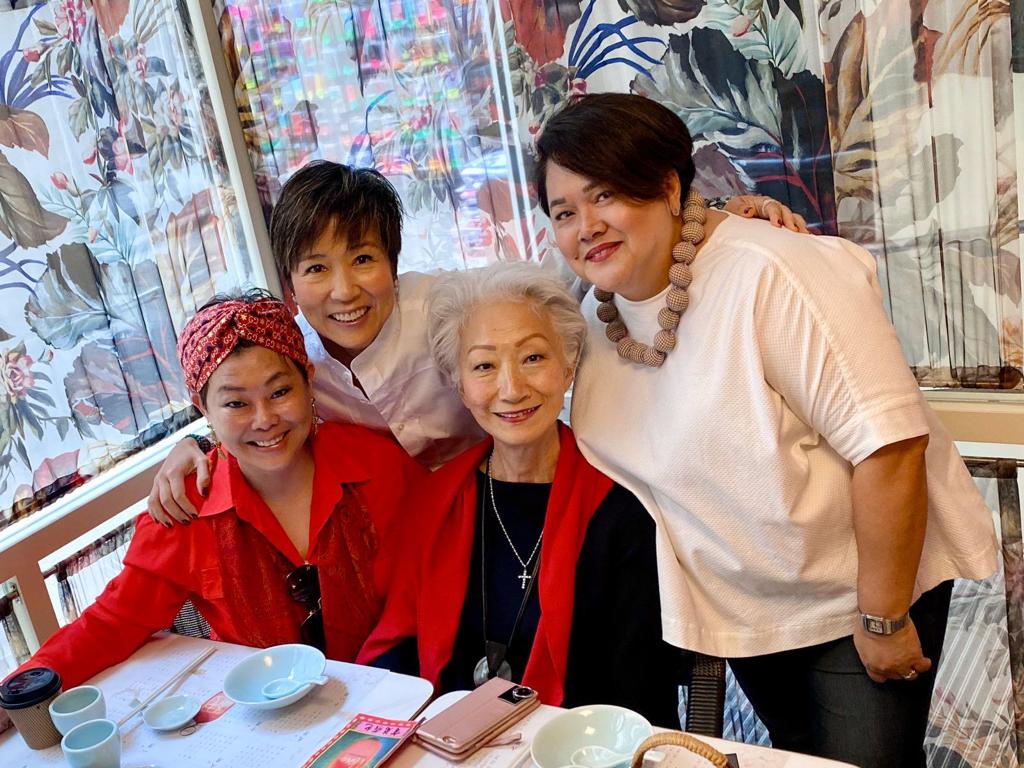
Magic Sisters
I understand you have a very tight group of women friends. How did that happen and what role do they play in your life? Have you always had something like this in your life?
There’s a common saying that we cannot choose our family but we can choose our friends. I love my siblings and have a tremendous relationship with my brother and sisters. I know they will always be there for me, however we are very different personalities. My Magic Sisters are “chosen.” It’s a friendship built on mutual trust, respect and support. It’s a circle of Sisterhood that will tell you the truth, be supportive and non-compromising. We did not plan it — it just happened.
There is some talk I have heard about you and your women friends looking to purchase a piece of property together so that in your later lives you will be able to be with each other. Could you tell us a bit about that?
We enjoy so much our time together — playing card games, singing together, observing the same faith. We all have to hang our hat sometime in the future where we can just put our toes in the sand, binge on marathons (Netflix), and it is important that we give ourselves a safety net. It has always been our idea that if we have a “common” address, in a destination that we all love and enjoy (sun, sea, and food) but still giving us privacy in a harmonious environment where there is health support and security, we can still be ourselves, but “share” in the future. Why not?
Wellness Regime
How do you take care of yourself? Do you have a fitness or wellness regime?
Hmm, I am really bad at this. I love dancing and, to me, this has been my help or a fitness program. I saw a video that I can dance with my own reflection in the mirror/ glass! Ha — I love this 20 min or so before a shower each morning… Exercise is something I do have to work on but I am careful with my diet: lots of colour, vegetables and little meat. I guess this is my Chinese upbringing …
“Life is to Live”
How is your approach to life now different from when you were in your 50s?
Oh, yes! I am so much more confident in myself. I know me. I am so much more patient. I don’t bash myself over superficialities, what should have been! It’s gone, it’s finished —forget about it… I see every situation (thing, person) that it has two sides and I take the time to appreciate the opposites. I don’t have to agree but I can hold my words. I have never taken the physical appearance seriously, even at 50 (with gray hair), and I have always been comfortable with how I look. And I am a proud mother to 3 wonderful daughters, my sunshines, and granny to 5 grandchildren who always bring a smile to my face and laughter to their comments.
My oldest grandson, Max, said to me one day when I said I could not walk or run as fast as he can because I am older than him, his immediate response was, “You are not old, Granny, you are just nearly new…” Life is to live. Today has gone and c’est la vie, but tomorrow will come and I will be blessed to wake up to live another day to the fullest.
Jean Sung is Executive Director and Head of The Philanthropy Centre, J.P. Morgan Private Bank, Asia Pacific. Prior to joining The Philanthropy Centre, Jean was Head of Global Philanthropy for J.P. Morgan in Asia Pacific (2006-2013), managing the firm’s corporate giving in 13 Asian countries. She is also an enthusiastic late-night fan of Netflix dramas.
The ideas expressed here are solely the opinions of the author and are not researched or verified by AGEIST LLC, or anyone associated with AGEIST LLC. This material should not be construed as medical advice or recommendation, it is for informational use only. We encourage all readers to discuss with your qualified practitioners the relevance of the application of any of these ideas to your life. The recommendations contained herein are not intended to diagnose, treat, cure or prevent any disease. You should always consult your physician or other qualified health provider before starting any new treatment or stopping any treatment that has been prescribed for you by your physician or other qualified health provider. Please call your doctor or 911 immediately if you think you may have a medical or psychiatric emergency.


